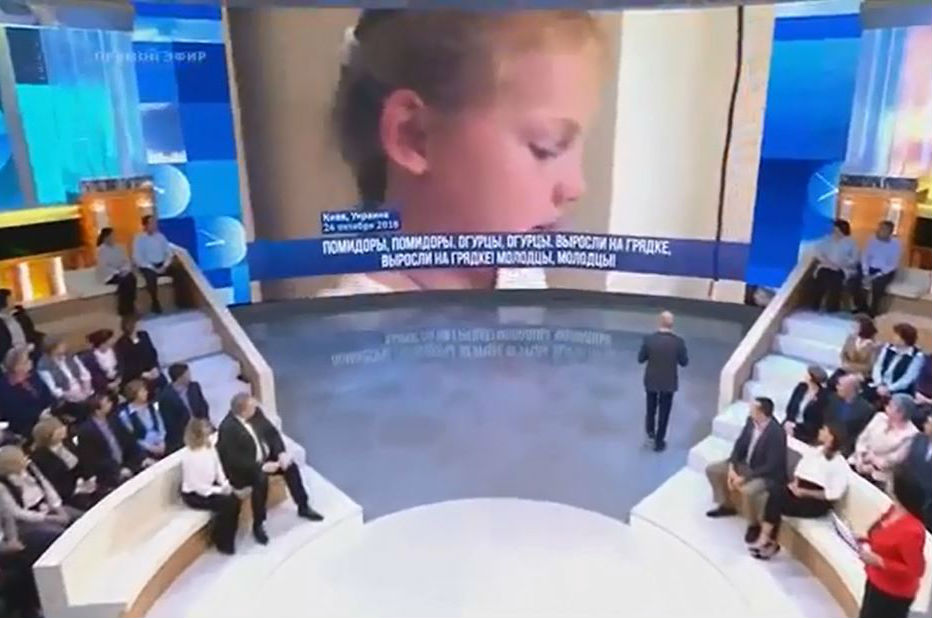 Eight-year-old Nina never wanted to be a star on Russian state television. Nevertheless, the Kyiv native was the subject of a one-hour discussion on Russia’s First Channel, a popular national show. The topic was hot: a Ukrainian family wanted their daughter to be taught music in Ukrainian.
Eight-year-old Nina never wanted to be a star on Russian state television. Nevertheless, the Kyiv native was the subject of a one-hour discussion on Russia’s First Channel, a popular national show. The topic was hot: a Ukrainian family wanted their daughter to be taught music in Ukrainian.
Nina’s music tutor teaches children using songs of Soviet diva Alla Pugachova who became popular after her hit “Millions of Red Roses” topped the USSR’s charts thirty-six years ago. Since then, things have changed. The USSR doesn’t exist and Ukraine has been an independent nation for twenty-seven years. Meanwhile, young people don’t remember or admire the Soviet system, but it’s still there.
The teacher claimed that there aren’t any exercises to study voice in Ukrainian. Nina’s mother was disappointed and took to social media to express her disappointment.
“There are dozens of private studios in Kyiv where you can study in Chinese, Yiddish, and Russian,” wrote Nina’s mother Khrystyna Kocira. “I do not need blood. Only respect for my child and language. And fulfillment of the law.”
In a video, Nina’s father demonstrated how the same exercise could easily be sung in Ukrainian.
Then the Russian propaganda machine went into overdrive.
These themes are painfully familiar to Ukrainians, and have been constantly repeated since 2014 when Russia donated soldiers, weapons, and propaganda to divide Ukrainian society into pro-Russian victims and fascists who followed the quasi-ideas of Ukrainian nationalist hero Stepan Bandera. With a straight face, one of the show’s experts says, “I am waiting for Ukraine to start shooting people for speaking Russian.” Other stories claim that anti-Russian xenophobia is rampant in modern Ukraine.
These sorts of shows are easy to dismiss, but when they appear on the First Channel, which has nearly 100 percent penetration in Russia, it would be short sided to do so.
Meanwhile, Nina’s tutor explained that she was teaching the Ukrainian-speaking child in Russian because she had been trained in Russian herself. The teacher had studied in Kherson, a city in a Russian-speaking region of southern Ukraine. It borders Crimea and has largely preserved Soviet nostalgia. In 1991, when Ukraine announced its independence, the city of over 300,000 had only two Ukrainian-language schools. Of course, the number of schools which teach in Ukrainian has since increased, but in Kherson Ukrainian is an artificial language used to pass school tests and not really used in daily life.
In 1990s, Ukrainian had a persistent image of a second-rate language spoken by uneducated villagers.
I know this first-hand because I grew up in Kherson, but I spoke Ukrainian out of conviction.
I was the only Ukrainian speaking child in my school. I did not have any friends until after I learned Russian when I was a teenager. My mother was ashamed when I spoke to her colleagues in Ukrainian and asked me not to speak in public. I refused to speak Russian because I never got a satisfying answer when to the question that my first teacher asked the class: “If they speak English in England, French in France, why do we speak Russian in Ukraine?”
I found the answers much later in history that preserved the events that made Ukrainians the target of linguistic oppression and demonstrated the traumatizing erasure of native culture. These traumas are still very much alive in Ukrainian society.
The roots of these traumas go back to the seventeenth century, when eastern and central Ukraine came under Russia’s influence, and over the next century was absorbed by the Russian Empire. Since then, the Ukrainian language has experienced at least 40 restrictive measures from Moscow, including banning, burning of Ukrainian books, closing Ukrainian schools, providing career benefits to Russian speaking professionals, and so on. Russian was artificially and forcefully made the prestigious language of successful, rich, and educated people.
This strategy still often carries on in eastern, southern, and central parts of post-Soviet Ukraine, even after Ukrainian has been made the official state language and the major language of study in public schools. Fueled by Russian propaganda and political fights for the electorate, the language issue is still divisive. To withstand Russian propaganda, the post-Revolution authorities banned Russian media and social media. This controversial decision made Ukraine the subject of an interesting experiment: could the violation of such basic democratic rules have a positive effect when a post-Soviet country with a fragile economy needs to deal with massive Kremlin propaganda?
The Russian response to Nina’s case demonstrates that the language topic is an important part of Moscow’s information strategy to spur mass manipulation and social division, and one that should not be ignored.
Iuliia Mendel is a Ukrainian journalist; she contributes to the New York Times and Politico.eu, and is a 2015 World Press Institute Fellow.
Image: Eight-year-old Nina practices her singing exercises in Kyiv, Ukraine. Courtesy Screenshot First Channel
